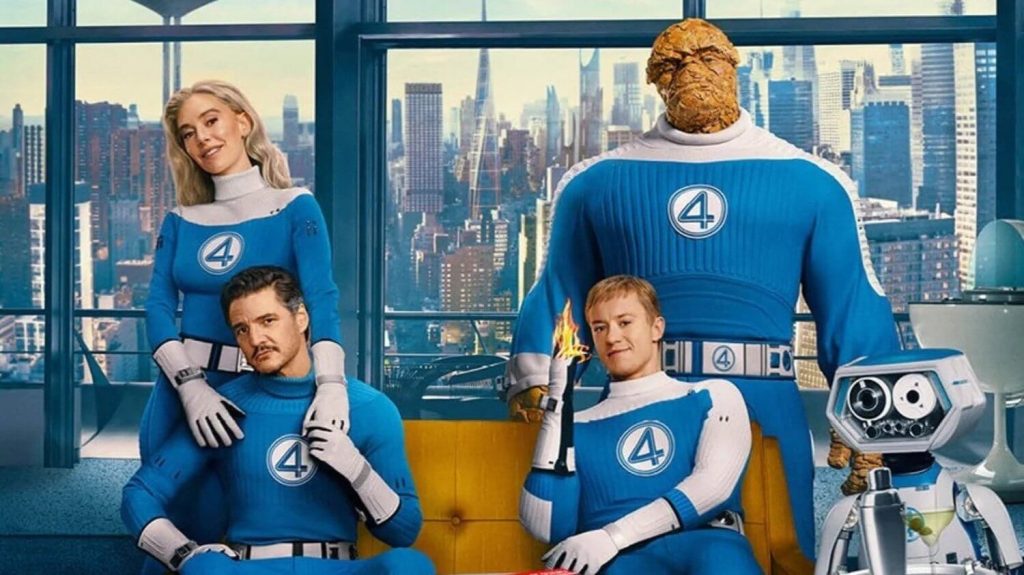world news
Fantastic Four Dominates the Weekend Box Office: A $218 Million Global Debut and the Future of Superhero Cinema
The Power of the Fantastic Four: A Storied Franchise’s Return to the Big Screen
The Fantastic Four franchise, one of Marvel’s earliest superhero teams, has experienced a tumultuous journey through Hollywood. From its first live-action adaptations in the 2000s to its more recent reinvention attempts, the Fantastic Four has always been a beloved but often inconsistent part of the superhero genre. Despite a strong comic book legacy, the team has struggled to find sustained success in the film industry, with past adaptations failing to live up to the potential of the source material.
However, the latest Fantastic Four movie, which recently topped the weekend box office with a massive $218 million global debut, has marked a pivotal moment for the franchise. With a fresh cast, an exciting new direction, and the backing of the Marvel Cinematic Universe (MCU), this Fantastic Four movie has proven that the superhero team is still capable of capturing the imagination of audiences worldwide. The success of the film is not only a triumph for the characters but also a testament to the growing strength of the MCU and its ability to reinvent legacy franchises for a new generation of viewers.
This $218 million global debut is a significant achievement in itself, signaling the return of the Fantastic Four as a major force in superhero cinema. The film’s success is a reflection of both the widespread appeal of superhero movies and the heightened anticipation surrounding this particular installment. Fans had been eagerly awaiting the arrival of the Fantastic Four in the MCU, and it’s clear that the combination of familiarity with the characters and Marvel’s signature storytelling style struck a chord with global audiences.

Box Office Domination: The Global Appeal of Superhero Films
In recent years, superhero films have dominated the global box office, with franchises like the Marvel Cinematic Universe (MCU), DC Extended Universe (DCEU), and Spider-Man proving to be major box office juggernauts. Superhero movies have become a dominant force in Hollywood, often grossing billions of dollars worldwide and setting new records with each release. The Fantastic Four’s impressive $218 million global debut is just the latest example of the genre’s power, particularly in a post-pandemic world where the movie industry has been trying to recover from significant disruptions.
What makes the Fantastic Four’s debut particularly impressive is the international component of the film’s success. While superhero films traditionally perform well in North America, the global market has become increasingly important for box office totals, and Fantastic Four proved that it could succeed not only in the U.S. but also in overseas markets. This $218 million debut is a strong indication that the film resonates with audiences beyond the U.S., with fans across the globe eager to see the iconic superhero team brought to life in the MCU.
Superhero films, especially those in the MCU, tend to perform exceptionally well in international markets due to their broad appeal. Action-packed plots, stunning visual effects, and the ability to tell universal stories of heroism and personal sacrifice contribute to the global success of these films. For Fantastic Four, the debut signals that there is a strong demand for superhero team-ups and for characters with long-standing histories in comic books and pop culture. With Fantastic Four now firmly a part of the MCU, the global audience’s excitement is likely to continue, ensuring that the franchise will have a lasting presence at the box office for years to come.
The Significance of the MCU: A New Era for Fantastic Four
One of the most important aspects of this Fantastic Four movie is its integration into the Marvel Cinematic Universe (MCU). The MCU has become the gold standard for superhero storytelling, with interconnected storylines, beloved characters, and blockbuster films that have changed the landscape of modern cinema. With the Fantastic Four now joining the MCU, the possibilities for storytelling are limitless.
The MCU’s influence on the Fantastic Four franchise is already apparent in the film’s tone, style, and approach to world-building. By incorporating the Fantastic Four into the MCU, Marvel has the opportunity to elevate these characters within the larger narrative of superhero films, allowing them to interact with iconic MCU characters like Iron Man, Captain America, Spider-Man, and the Avengers. This new dynamic introduces fresh storytelling possibilities and connects the Fantastic Four to the established, well-loved MCU universe. For fans, the inclusion of these characters within the MCU is thrilling, as it opens the door for exciting crossovers and team-ups that have previously only existed in the pages of comic books.
The MCU’s approach to the Fantastic Four is a welcome change for many fans who have longed to see the characters treated with the same care and attention as other Marvel superheroes. While earlier Fantastic Four films struggled to capture the essence of the team, the MCU’s cohesive storytelling and high production values ensure that this new chapter will be both entertaining and faithful to the comic books. As a result, the Fantastic Four is poised to become a major fixture in the MCU, contributing to its ongoing success and furthering Marvel’s dominance in the superhero genre.

The Future of Fantastic Four in the MCU: Endless Possibilities
The success of the Fantastic Four movie in its opening weekend is only the beginning of what promises to be an exciting future for the franchise. With the Fantastic Four now officially part of the MCU, the characters have endless possibilities for future storylines, crossovers, and solo adventures. Marvel Studios has already proven its ability to create interconnected, multi-faceted universes with films like Avengers: Endgame and Spider-Man: No Way Home, and the Fantastic Four will likely play a key role in the next phase of the MCU.
One of the most exciting prospects for the Fantastic Four in the MCU is the opportunity to explore new and diverse story arcs. The team’s unique dynamic—composed of the brilliant scientist Reed Richards, the fearless Sue Storm, the hot-headed Johnny Storm, and the strong but gentle Ben Grimm—has the potential to add emotional depth and complexity to the MCU. Fans can look forward to the Fantastic Four embarking on interdimensional adventures, exploring cosmic storylines, and perhaps even teaming up with the X-Men or other Marvel characters. These future crossovers could bring fresh energy to the MCU while expanding the scope of the superhero universe.
Additionally, the Fantastic Four’s inclusion in the MCU opens the door for exploring deeper themes of family, sacrifice, and legacy. At its core, Fantastic Four is a family story, and the dynamic between the four members will offer ample opportunity for emotional storytelling within the larger MCU framework. With the right creative direction, the Fantastic Four can become not just another superhero team, but a cornerstone of the MCU’s future—contributing to the next phase of superhero narratives and inspiring generations of fans to come.
The Enduring Appeal of Superhero Films: What Fantastic Four’s Success Means for the Industry
The overwhelming success of Fantastic Four’s global debut is part of a larger trend in the film industry, where superhero films continue to dominate the box office and cultural conversation. Superhero movies, particularly those produced by Marvel Studios, have become the dominant genre of the 21st century, attracting millions of fans and generating billions of dollars in revenue. This success is a testament to the widespread appeal of these stories, which combine action, adventure, character development, and timeless themes of heroism and personal growth.
What Fantastic Four’s $218 million global debut signals is the continued strength of the superhero genre and the demand for new, innovative takes on beloved comic book characters. As Hollywood looks to build new franchises, superhero films will likely remain at the forefront of the industry. The Fantastic Four’s debut proves that there is still a massive appetite for fresh stories within the superhero genre, especially when they are anchored in established franchises like the MCU.
Moreover, the success of Fantastic Four shows that fans are eager for new content, particularly when it comes to legacy characters that have been reinvented for modern audiences. The film’s positive reception is a reminder that audiences want both familiarity and innovation—an opportunity to see iconic characters like the Fantastic Four reimagined in exciting new ways. As Hollywood continues to move toward blockbuster franchises, Fantastic Four’s success will likely inspire other studios to revisit classic characters and offer new spins on their stories, ensuring that the superhero genre continues to thrive.
Conclusion: The Bright Future of Fantastic Four and the Superhero Genre
The Fantastic Four’s triumphant $218 million global debut marks a new chapter for the franchise and for superhero films as a whole. The movie’s success highlights the enduring appeal of superhero stories and the power of the MCU to reinvigorate long-standing franchises. With the Fantastic Four now firmly integrated into the MCU, fans can look forward to a bright future filled with thrilling adventures, emotional depth, and exciting crossovers.
As superhero films continue to dominate the box office, the Fantastic Four’s success serves as a reminder of the genre’s universal appeal and the power of beloved characters to transcend time and space. The Fantastic Four is now poised to play a key role in shaping the next phase of the MCU, offering fans a fresh perspective on a team that has been an integral part of comic book history. With the right direction, the Fantastic Four will undoubtedly become a cornerstone of the MCU, continuing to inspire fans for years to come.
From pegasusapparelus

